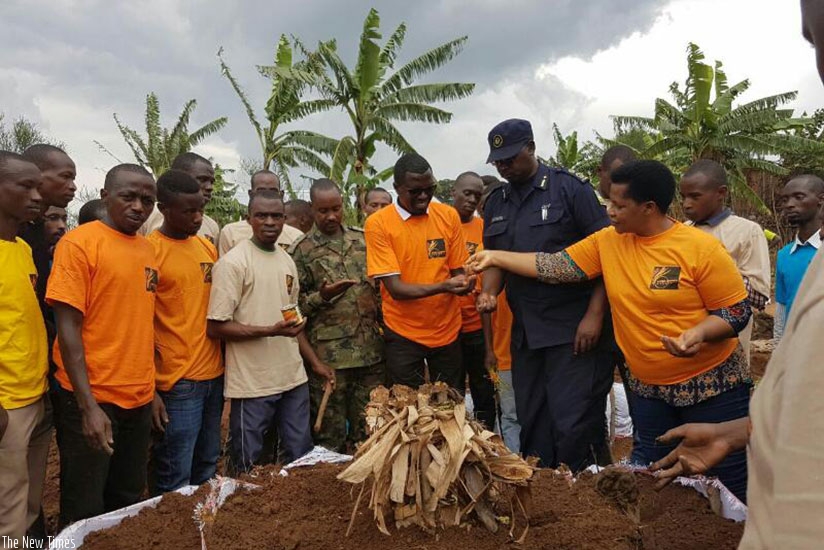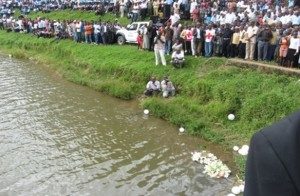
Student survivors find healing through AERG.
By Lydia Atieno, The New Times.
After the 1994 genocide against the Tutsi, many survivors lost their families and had no place to call home or a family to lean on. This is how the idea of The Association of Student Survivors of the Genocide (AERG) and Former Students who survived the Genocide against the Tutsi (GAERG) came to life in 2003.
GAERG-AERG is an organisation comprising about 2,000 former survivor students whose mission is, “to create a world where the memory of genocide is preserved and a self-sustaining genocide survivor’s community exists.”
According to Olivier Mazimpaka, the president of the organisation, this platform aims at helping these students feel appreciated and know that there are people who care for them.
“We realised that there was disharmony among survivor students. The organisation was formed to create that link among the families that were affected by the Genocide,” he says.
Mazimpaka says gathering together as students has helped the fresh graduates to learn from their older counterparts to forget the past and work towards a brighter future.
“This is done through sharing experiences of the past and how they have been able to move on. As young graduates, it gives them hope and opens their minds to what they should do to maintain peace,” he adds.
The organization also helps new graduates to find jobs, among others.
One student’s tale of hope
Emilie Karamusta was only seven when his father and two brothers were killed and thrown in Nyabarongo River during the Genocide. Now 29 years old, he still remembers how he was able to escape death with his elder brother.
“We managed to escape because during that time when the killers came for us at home, my brother and I had gone to the farm. When we heard gunshots, we knew they were killers. We managed to escape and seek refuge in a Hutu family who hid us until the killings ended,” he says.
Karamutsa says although he survived, he saw children, women and all types of people being killed and their bodies scattered all over, memories that, he says, form the darkest part in his life.
Before joining the group in 2013 after graduation, he could barely erase these horrific scenes from his mind.
But now with the group, Karamutsa has been able to gather courage from the other members whose stories of the past are even worse. Through this, he has learned to build his career as a leader and he is helping others who are still in that situation. He is serving as a commissioner in charge of education at GEARG.
The organisation’s activities
Mazimpaka says 75 per cent of the members are employed and have a savings scheme where each member contributes Rwf 3,000 monthly. The money is meant to help other needy families of genocide survivors.
He says that as a group, they meet twice a month to create ‘families’ for themselves. The members are grouped into 69 families with 30 to 40 members each, where each family is required to at least pay school fees for one needy student from those affected by the Genocide.
The main reason why they do this is to create families of their own. They assist each other financially in case of any events such as weddings, funerals and parties, as well as anything that requires money.
“This is mainly to support each member so that they don’t feel isolated, most importantly because they were either left without parents or any member of the family,” says Mazimpaka.
Emmanuel Twahirwa, the coordinator of GEARG, says they create these groups so that they are assured of people to count on whenever they are faced with any challenge.
“For instance, we identify the most needy ones across all the districts build them houses, give cows and pay school fees for the students who are also from the survivors’ families,” he says.
The members are also involved in a wide range of other activities that are related to the Genocide. These activities include writing books where each member shares their story.
Activities related to the commemoration period
Mazimpaka says last month, they had the AERG/GAERG Week, where they went to different districts building houses, preparing small gardens as well as giving cows to the needy, even for those who are not survivors but played a role in saving some of the Tutsi during the Genocide.
The members also cleaned the memorial cites, and engaged in various activities aimed at fighting genocide denial and ideology.
“We do this through awareness drives by talking to different people about what happened during the Genocide,” says Twahirwa.
Achievements
According to Twahirwa, the organisation has helped in bringing young survivors together to work as one family.
“Most of the youth have learnt how to stay focused and work together to help those who are still struggling. They have also learnt that despite the rocky past, they are still valued,” he says.
They also have a project in partnership with Survivors Fund where they give fresh graduates small loans to start their own businesses.
Apart from that, the group also has more than 50 small projects where they support women from rural areas to get involved in art work such as basket weaving.
Under AERG, many youth have been rehabilitated.
“Some youth had taken the wrong path such as using drugs in order to forget what they experienced during the Genocide. But through our activities, they have found ways of managing the situation,” says Rwahirwa.
Mazimpaka, however says, “Fighting against Genocide denial and tracking the perpetrators is still a challenge. Some survivors are still traumatised. We still have a long way to go but we are hopeful for a better future despite these challenges.”

